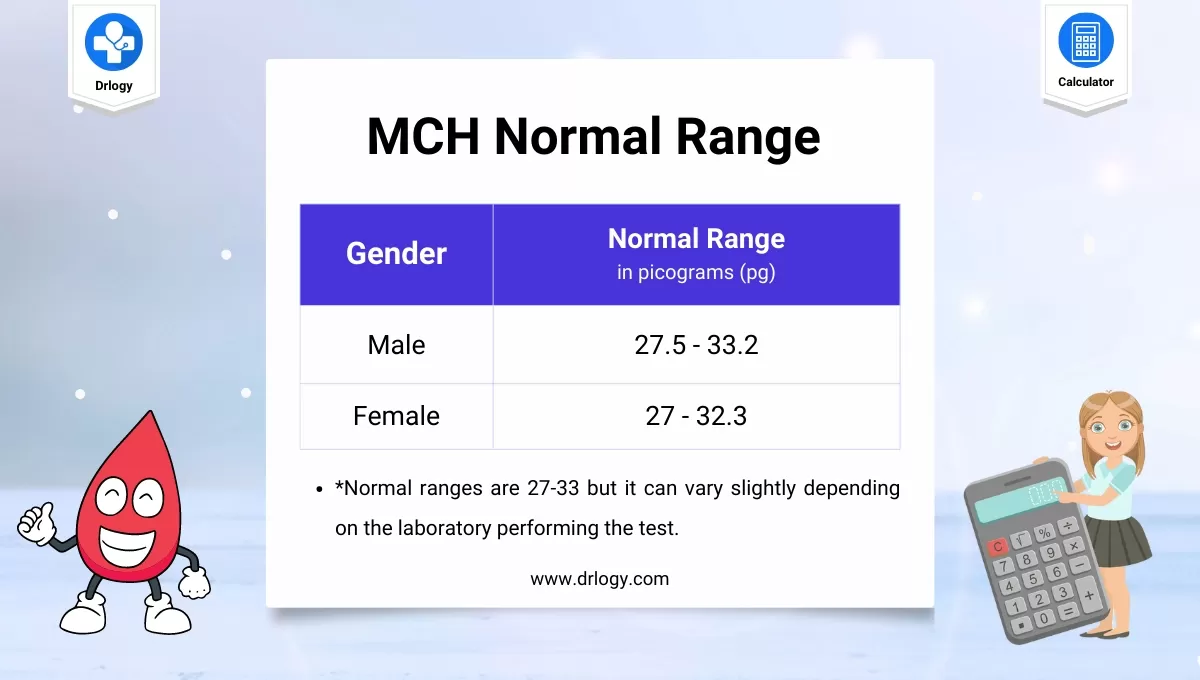Body Measurements
Blood & Cholesterol
Medical Measurements
Body Measurements
Health Scores
Temperature & Time
Miscellaneous Conversions
Small Mammal Pregnancy
Sheep & Mare Gestation
Swine & Livestock Gestation
Doctors Nearby Me
Top Healthcare Professionals
Lab Tests
Health & Medical Days
Calculator
Drlogy Hospital Software
Drlogy Specialty Software
Drlogy Pathology Lab Software
1000+ Pathology Lab Report Format
Drlogy Radiology Software
Drlogy Free Profile Listing
Drlogy Letterhead
Drlogy ICD Codes

The mean corpuscular hemoglobin (MCH) is a measure of the average amount of hemoglobin in each red blood cell.
MCH Normal values for the above parameters can be found in the table below:
| Parameter | Normal range |
| Hemoglobin | 12 – 18 g/dL |
| RBC | 4.2 – 6.3 million cells/mcL |
| MCH | 27 – 33 pg |
The normal range of MCH in males and female are given below.
| Gender | Normal Range in picograms (pg) |
| Male | 27.5 - 33.2 |
| Female | 27 - 32.3 |

Here's a table that can help with interpreting MCH values:
| MCH Value (pg) | Interpretation |
|---|---|
| < 27 | Low (hypochromic) |
| 27 - 33 | Normal |
| > 33 | High (hyperchromic) |
The interpretation of MCH values may vary depending on the individual's medical history, symptoms, and other factors. Your healthcare provider is best equipped to interpret your MCH value and determine any necessary next steps.
A high MCH (mean corpuscular hemoglobin) value indicates that there is an excess amount of hemoglobin in each red blood cell. There are several possible causes of a high MCH value, including:
A low MCH (mean corpuscular hemoglobin) value indicates that there is a lower-than-normal amount of hemoglobin in each red blood cell. There are several possible causes of a low MCH value, including:
Interesting Facts About MCH
- The concept of MCH was first introduced in the 1920s, to know the relationship between hemoglobin levels and red blood cell size. The term "mean corpuscular hemoglobin" was coined in the 1940s.
- MCH is often used in conjunction with other measures of blood health to diagnose and monitor various conditions, including anemia, sickle cell disease, and thalassemia.
- MCH is not a standalone test, and should always be evaluated in the context of other blood tests and medical history.
- MCH is typically measured as part of a complete blood count (CBC) test, which is a common blood test that evaluates a variety of blood components.
- The level of MCH can be affected by a variety of factors, including age, sex, genetics, and overall health status.
- MCH levels can be increased by smoking, alcohol consumption, and exposure to environmental toxins.
- MCH levels can be decreased by certain medications, including chemotherapy drugs and anticonvulsants.
The MCH (mean corpuscular hemoglobin) calculator can be a helpful tool for both healthcare providers and patients. Here are some potential benefits of using the MCH calculator:
Summary
Overall, the MCH calculator can be a useful tool in the diagnosis and management of various health conditions. However, it's important to note that the MCH value should always be interpreted in conjunction with other blood test results and a thorough medical evaluation. Check More Medical Health Related Calculator on Drlogy Calculator to get exact health solution.
Reference
The MCH (Mean Corpuscular Hemoglobin) is the average amount of hemoglobin in a single red blood cell and is calculated using the following formula:
MCH = (Hemoglobin ÷ Red Blood Cell Count) x 10
Where Hemoglobin is measured in grams per deciliter (g/dL) and Red Blood Cell Count is measured in millions per microliter (million/μL).
Low MCH (Mean Corpuscular Hemoglobin) means that the average amount of hemoglobin in each red blood cell is lower than normal.
DOCTOR'S MOST TRUSTED HEALTHCARE PLATFORM
10M+
Patients
30000+
Doctors
25000+
Hospitals/Labs